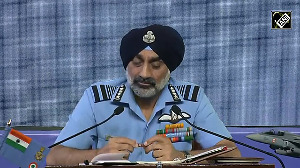In doing so, many feel that he has reasonably addressed, for the time being, most major objections raised in India by the Left opposition parties and the scientific and strategic communities. But the BJP is still unhappy that several of its objections to this deal still remain unanswered.
The prime minister had made similar statements in the past to Parliament, and yet the direction in which the US Congress is continuing to frame the associated laws is in serious departure with all his earlier promises.
One, therefore, hopes that the clear policy stand of the government enunciated in the Rajya Sabha, in its totality, will be formally conveyed by the PM to President Bush, so that the US administration and Congress have a clear understanding of the outer limits of Indian flexibility.
In an article of this nature with stringent word-limits, it is impossible to offer a comprehensive treatment of all the related issues. This particular column, therefore, has only touched upon some of the issues the prime minister did talk about. The remaining issues from his talk, as well as some others he did not mention, will have to be the subject matter of another column.
In his August 17 address, the prime minister stated that he 'shall begin by affirming that our approach is guided by the understandings contained in the July 18, 2005, Joint Statement and the March 2006 Separation Plan. What we can agree with the US to enable nuclear co-operation must be strictly within these parameters -- we will not accept any conditions that go beyond these parameters agreed to between India and the US.'
He also stated that he has conveyed this position to President Bush and he 'has received an assurance from the President that the parameters of the scope of co-operation would be those contained in (these two documents).'
Therefore, this mutually agreed joint position will be the fundamental basis for all bilateral negotiations on the Indo-US nuclear deal as far as the government is concerned.
Incidentally, there are a few in the scientific community who may argue that the Separation Plan should be re-examined and changed even at this late date. But, any lacunae in or doubts they may have about this plan can as well be corrected through incorporating suitable clauses in the 123 agreement and the IAEA safeguards and additional protocol agreements, both of which we are yet to finalise.
On the possibility of US law restricting the transfer of technologies related to reprocessing and enrichment, the prime minister said, 'We seek the removal of restrictions on all aspects of co-operation and technology transfers pertaining to civil nuclear energy -- ie, all aspects of a complete nuclear fuel cycle.'
The final version of the US law may at best be silent on this issue, but US policy will remain the same. In all areas where India wants to improve certain technologies, plants and processes both in the civilian and military sectors, it will be almost impossible for a donor country or the IAEA to ensure that India may not be using the non-material inputs obtained from abroad (for the civilian safeguarded side) in similar applications in the unsafeguarded military areas.
Besides, the 45-nation NSG is not in favour of transferring reprocessing or enrichment technologies to any country, and in fact are strengthening their controls to ban such transfers. So, India will definitely face an uphill task in trying to import such technologies.
As for reciprocity of actions, the prime minister has clarified that 'the nuclear facilities listed in the Separation Plan will be offered for safeguards only after all nuclear restrictions have been lifted on India. This would include suitable amendments to the US legislation to allow for such co-operation, the passing of a bilateral agreement with India and the adaption of NSG guidelines.'
Whether the changes in US laws will precede the bilateral agreement or not is unclear, but enough safeguards can be built into the bilateral agreement, which is still to be finalised.
Another important assertion that the prime minister made is that 'the proposed US legislation on nuclear co-operation will not be allowed to become an instrument to compromise India's sovereignty.'
In response to the reference to Iran and the Proliferation Security Initiative in the proposed US law, he said, 'We reject the linkage of any extraneous issue to the nuclear understanding. India's foreign policy will be decided on the basis of Indian national interest only.'
The PM did not refer to the US prescription that India is expected to join the Australia Group and the Wassenaar Arrangement, though these two are also extraneous issues.
It is also disturbing to note the March 16, 2006, statement of US Undersecretary Nicholas Burns in Washington that 'India has also agreed to align itself with the other international regimes concerning proliferation -- the Australia Group and the Wassenaar Arrangement.'
The government needs to clear up this contradiction. Our negotiators will have to insist that references to Iran, PSI, the Australia Group and the Wassenaar Arrangement should be totally removed from the forthcoming legislation, even if they are in sections of the law which may be interpreted as 'non-binding'.
On nuclear weapons testing, the PM asserted that, 'Nuclear weapons are an integral part of our national security and will remain so, pending the global elimination of all nuclear weapons and universal non-discriminatory nuclear disarmament... The US has been intimated that reference to nuclear detonation in the India-US bilateral agreement as a condition for future co-operation is not acceptable to us. We are not prepared to go beyond a unilateral voluntary moratorium on nuclear testing.'
The US may agree to omit any mention of testing in the 123 agreement, but the fact remains that as long as the India-specific legislation does not distinctly provide a waiver of Section 129(1)(A) of the US Atomic Energy Act, it will be mandatory on their part to suspend all nuclear co-operation under this agreement if we ever test a nuclear explosive device in the future. There is a similar provision in the US Nuclear Non-Proliferation Act 1978, and it is therefore highly unlikely that US Congress will approve such a waiver.
However, even if India conducts a weapons test in future, Section 129 of the Atomic Energy Act gives the President the option to waive the termination of exports under the nuclear co-operation deal, if he determines that cessation of such exports to India would be seriously prejudicial to the achievement of US non-proliferation objectives or otherwise jeopardise the common defence and security.
But, the catch is that US Congress also has to agree with the President 's determination in this matter. There is only a very slim chance of a future US President and Congress giving such a waiver after an Indian test, especially if India continues to pursue an independent foreign policy.
But, the punitive sanctions which will be imposed by the US (and a host of other countries) on India if we ever conduct a nuclear test will be just the same, with or without this deal in force. The difference, with or without this deal, will be seen mostly in the resulting adverse impact on the Indian economy and to overall national security.
If India is well on the road to effectively deriving nuclear and non-nuclear benefits from this co-operation, the damages consequent to a future nuclear test could be several-fold more intensive as compared to what we may have suffered without this deal in place. So the question we need to face is whether we should try and avoid such severe damages in the first instance by not undertaking a test or, if we indeed must test at a later date, whether we can withstand these and other severe repercussions and bounce back from them within a reasonable time. This has to be the core evaluation and judgement of any future Indian government while it weighs the pros and cons of nuclear testing.
The government cannot escape the fact that it has so far failed to impress upon the US administration and, through them, US Congress, about the Indian sensitivities on various issues pertaining to this deal. The increasing departures between what the government had been repeatedly promising us in Parliament and the contents of the US legislation currently being finalised in Washington show that US Congress is vehemently safeguarding US interests in line with their own unique perceptions, which differ in many ways from that of the US President and his administration.
That being the case, as a dignified and sovereign nation, India must also then decide not to proceed with this deal any further. The moment for that decision will come when Congress passes the reconciled final legislation on the waiver of US laws, and if it still retains in it stipulations and clauses contrary to the stated Indian position. Until then, we must rally behind the PM, but certainly not thereafter if he is unwilling to pull India out of this deal.
India has heard enough from US Congressmen Lantos, Hyde, Lugar, Biden, Boxer and others. Now, it is for US Congress to seriously ponder over what Prime Minister Manmohan Singh has stated in the Rajya Sabha on August 17 and decide whether it wants this deal to be concluded within the limits he has clearly laid out.
The choice is theirs, because a clear majority of the Indian Parliament, its scientific and strategic community, and the general public stands firmly with the prime minister, and they are unwilling to budge any further.
Dr A Gopalakrishnan is a former Chairman of the Atomic Energy Regulatory Board, Government of India. He can be reached at : agk37@hotmail.com
The nuclear deal: Complete coverage | Chats





